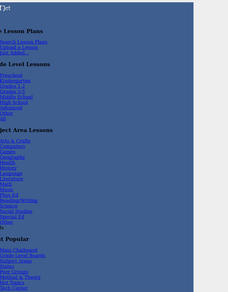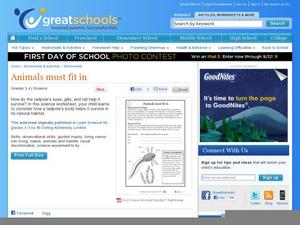Curated OER
Squid Dissection
First graders participate in dissecting a squid. They identify and locate specific parts of a squid with teacher guidance. They draw a picture of what their squid looked like and label specific parts.
Curated OER
Ego Trip- Exploring the Inner Workings of the Human Body
Students gain an understanding of how systems and organs in the human body work. They create their own fictional account of a trip through the human body, and describe one response the body makes to stimuli.
Curated OER
Can You Adapt?
Using the Montana State Quarter, learners engage in activities designed to help increase their understanding about how animals must change their social and physical behaviors in order to adapt to their environment. Excellent worksheets...
Curated OER
Where Are the Dinosaurs?
Learners view videos and websites and create finger puppets and hatchable eggs. In this dinosaur lesson plan, students view video clips and a website to introduce the dinosaurs. They do a finger puppet play and create hatchable dinosaur...
Calvin Crest Outdoor School
Survival
Equip young campers with important survival knowledge with a set of engaging lessons. Teammates work together to complete three outdoor activities, which include building a shelter, starting a campfire, and finding directions in the...
Curated OER
Calorie Calculations through Beach Activities
Beach activity separates babes from blobs! Your class learns about calculating the number of calories used during physical activity. A worksheet is provided in which the activity of five different people at the beach is listed for...
Curated OER
Is it alive?
Kids in grades K-2 increase their logical reasoning and visual discrimination skills by determining which things shown are alive. They use the criteria that all living things move on their own to mark each image as alive or not.
A to Z Teacher Stuff
Word Search Match
Go beyond a traditional word search with a clue matching, word search combo. Scholars read clues, write the word that matches, then search for the word in a puzzle. Clues and words offer insight into the life of polar bears.
Polar Trec
Calorimetry Lab
Young people between the ages of 11–13 need on average about 2,000 calories per day. Within the lab, groups learn about calorimetry and respiration. They explore how it pertains to humans and animals living the Arctic where cold...
Curated OER
Narrative Writing Lesson
Sixth graders experience the stages of process writing, work cooperatively, to critique and to incorporate software tools to enhance writing and problem solving skills.
Curated OER
Build a Coral Polyp
Young scholars build a coral polyp out of a banana, straw, oyster crackers, sprinkles, and more. In this coral polyp lesson plan, students also list the differences between plants and animals.
Khan Academy
Project: Ad Design
Let your young programmers' creativity and programming knowledge shine with this culminating activity. Coders put together everything they know about using text commands, drawing, and animation to create a unique ad. This activity could...
Khan Academy
Challenge: Mouse Tracker
Create a small but useful little program that allows you move a dot with your mouse and see the coordinates change as the mouse moves. Starting with a dot that moves with the mouse, add to this program the text of the points...
Curated OER
Animals Must Fit In
A instructional activity on tadpoles is here for your young biologists. Learners read a short paragraph on tadpoles, then answer three questions regarding how parts of their bodies help the tadpole to survive in the pond. There is a good...
California Polytechnic State University
Australian Geography Unit
At the heart of this resource is a beautifully detailed PowerPoint presentation (provided in PDF form) on the overall physical geography of Australia, basic facts about the country, Aboriginal history, and Australia culture and lifestyle.
Other popular searches
- Rainforest Food Webs
- Ecosystem Food Webs
- Ecology Food Webs
- Rain Forest Food Webs
- Food Webs, Energy Pyramids
- Ocean Food Webs
- Food Webs and Chains
- Marine Food Webs
- And Food Webs
- Ecosystem, Food Webs
- Ecology Food Webs Chains
- Food Webs Energy Pyramids

















